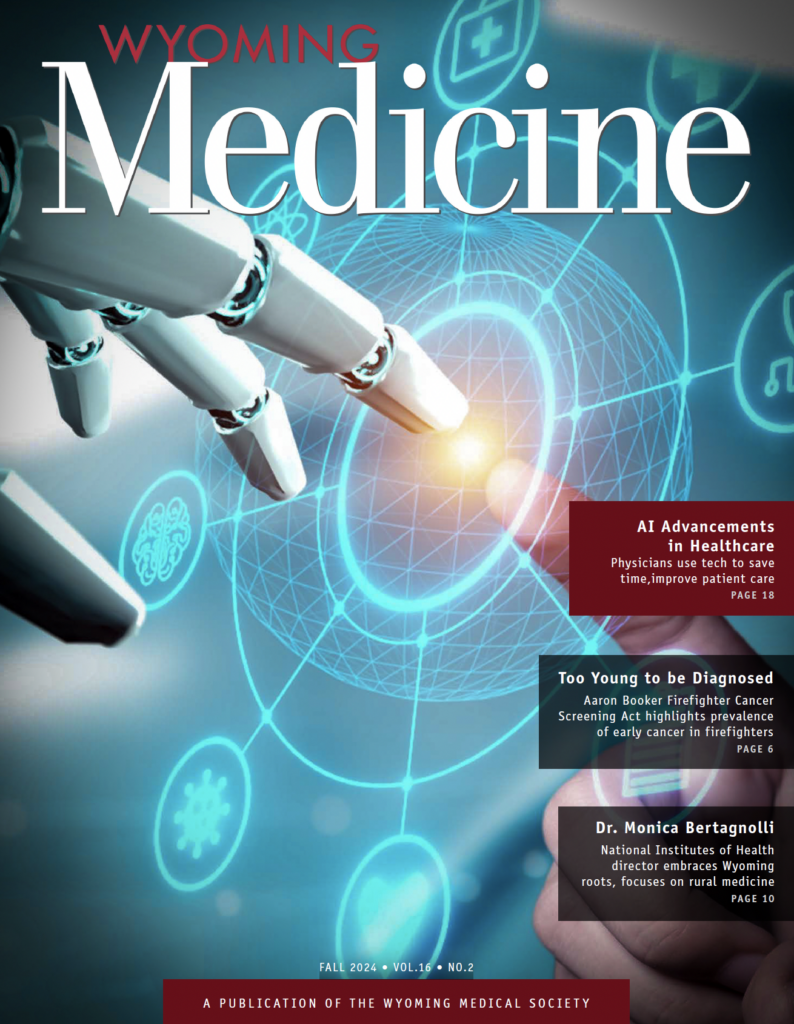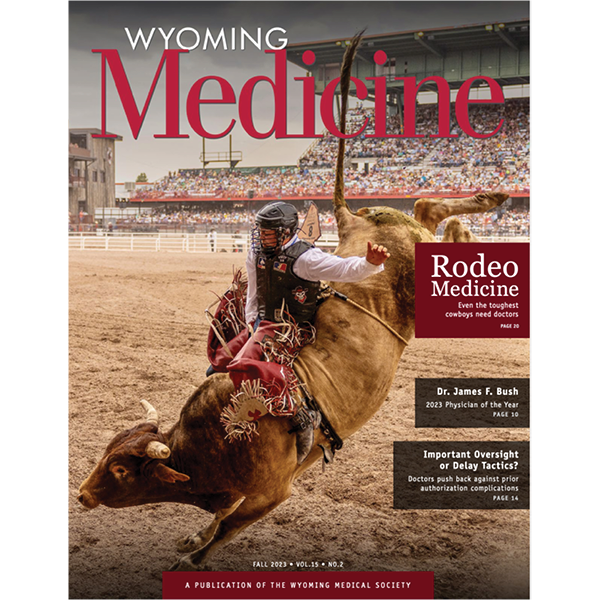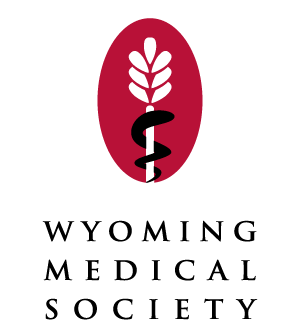
Wyoming Medical Society Mission: Advocating for doctors and their patients since 1903
Wyoming Medical Society Mission: Advocating for doctors and their patients since 1903
Originally published in Wyoming Medicine Spring 2023
Support. Oppose. Neutral.
These are the available single- Simple, right? These are the available single-word responses to any piece of legislation or policy that
comes across our board table. Simple, right? Actually, quite the dramatic opposite. The process is complex and nuanced. As one side perceives it: we didn’t fight hard enough, we gave up, we lost. And on the other side: the same. With any bill, and in particular for those with very strong convictions on either side, a single-word response has limited meaning, and should be taken in context of the entirety of a bill, including its intent, the precedent it may set, and potential ramifications. These responses cannot, and should not, be taken as an absolute decree. Indeed, many pieces of legislation in the past five years have had damning consequences for patients, physicians, and medical practice, beyond their purported intent. It is this uphill battle that we fight constantly at the Wyoming Medical Society.
So how do we ultimately get to one of those one-word responses on any given piece of legislation? The Wyoming Medical Society board of trustees meets quarterly, either in person, or via teleconference. In addition to the business of the society, including the budget and other matters, we discuss legislative policy. Our executive director compiles a list of all medically relevant topics for discussion, including upcoming proposed legislation, requests from various legislators and organizations, and topics brought forth by board members, society members, and others. The board then discusses the topics, develops an action plan, and renders a stance by board vote with a simple majority as directed by our bylaws, which are governed by state statute. The information is then presented to society members via regular email updates and through their county or regional society representative. Any member is allowed to attend any board meeting.
The Wyoming Medical Society is a political advocacy organization, whose mission is, as stated above, “Advocating for doctors and their patients since 1903.” Political advocacy is messy. Ideology often butts heads with pragmatism. We must not let fervent ideology control the conversation, lest we wish to lose more control of our profession. Plainly spoken, we must play the game. This means give and take. In pragmatic terms, this looks like supporting a bill we don’t like if certain legislators agree to take out the really bad stuff, or if they support us on another bill. If we go hardline in any direction, we risk a worse version of a given bill, or losing support entirely on future legislation.
Society members have a number of ways in which they can influence WMS policy and positions. This includes communication through their county trustee who holds voting power on the board, appealing decisions of the board as outlined in our bylaws, and using The Wire, our new member engagement tool designed specifically for members to communicate anything of importance to all society members.
Because many of the topics as of late have fervent supporters on either side, within and outside of medicine, we must work with our mission ever in the forefront. With our mission as a beacon, our advocacy work for medicine in Wyoming is centered on a few tenets.
These are as follows:
- We oppose any legislation that seeks to criminalize physicians, PAs, or the practice of medicine. We believe that the tort system effectively and appropriately punishes providers in cases of negligence.
- We believe the legislature has NO business dictating the practice of medicine. Indeed, there have been various members of the legislature in the past five years who have made this assertion, claiming to not have enough expertise to legislate the practice of medicine (e.g., optometry scope of practice expansion).
- We believe in physician, PA, and medical practice autonomy (see below).
- Our advocacy work is, and should be, nonpartisan.
- Our advocacy work should not be bounded by our own personal beliefs.
Regarding evidence-based medicine, the Wyoming Medical Society does not set medical guidelines, direct the practice of medicine, or otherwise tell physicians or PAs how to practice. We believe strongly in physician autonomy, individually and as a profession. There is a great breadth of medicine across all specialties. Even within a given specialty, practices vary greatly. We believe physicians are, and should be, stewards of evidence-based medicine, with flexibility to adjust practice based on the available evidence. Again, we do not believe the legislature is capable of deciphering what is, or is not, good evidence, and therefore should not be legislating based on their perceptions of such evidence.
Our own personal beliefs are important, but should not be taken as a referendum for the whole of medicine. We all took variations of the Hippocratic Oath when we became physicians. Among many very important details, a personal or political guide to our profession is not included. The oath is people- centric, including both individuals and populations. Similarly, the American Medical Association Code of Ethics contains many virtuous principles. Among others, it advocates that we “regard responsibility to the patient as paramount,” and allows physicians freedom “to choose whom to serve, with whom to associate, and the environment in which to provide medical care.” But this does not give that same physician allowance to limit care for an individual or a population. I mention these principles not to diminish anyone’s personal beliefs, but as a reminder of how we conduct ourselves professionally, and in advocacy work, the mission of which is to support physicians and their patients. Though difficult at times, WMS policy decisions should be based on how they will impact physician and PA medical practice and the physician/patient relationship,and not partisan politics or personal beliefs.
For 120 years the WMS board and staff have been proudly and vigorously fighting every day for each of you, our patients, and our profession. Each position will certainly not be agreeable to every member, though I am confident that regardless of any divergent beliefs, we still have common interests in a profession that is far bigger than any one of us.
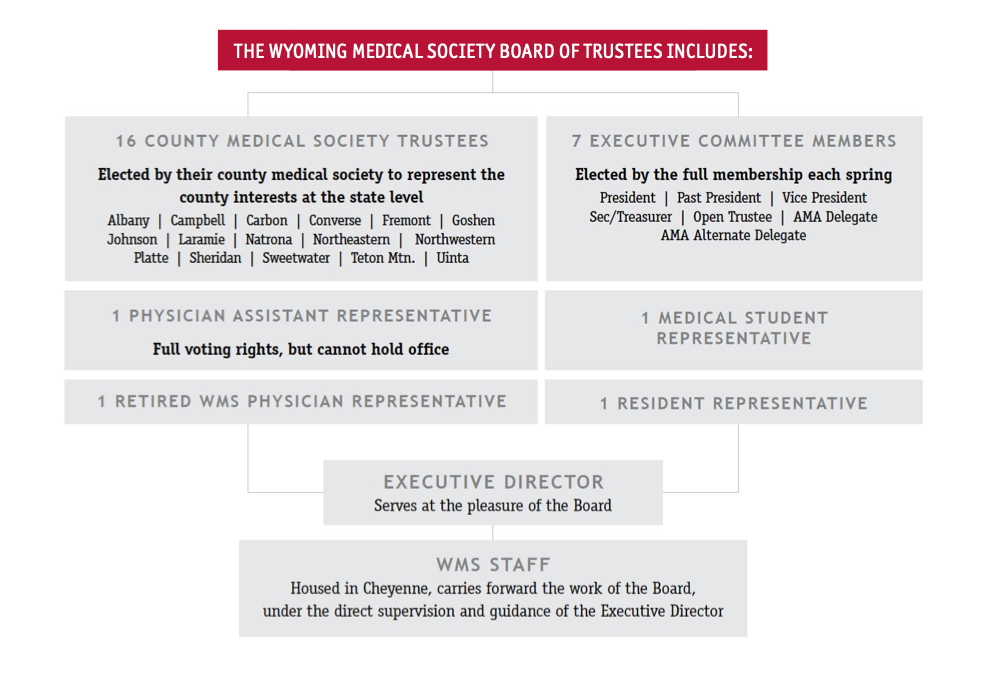
Disclaimer
This web site is provided for educational and informational purposes only and does not constitute providing medical advice or professional services. The information provided should not be used for diagnosing or treating a health problem or disease, and those seeking personal medical advice should consult with a licensed physician. Always seek the advice of your doctor or other qualified health provider regarding a medical condition. Never disregard professional medical advice or delay in seeking it because of something you have read on the Wyoming Medical Society's website. If you think you may have a medical emergency, call 911 immediately. No physician-patient relationship is created by this web site or its use. Neither WMS nor its employees, nor any contributor to this web site, makes any representations, express or implied, with respect to the information provided herein or to its use.
WyoMed Blog
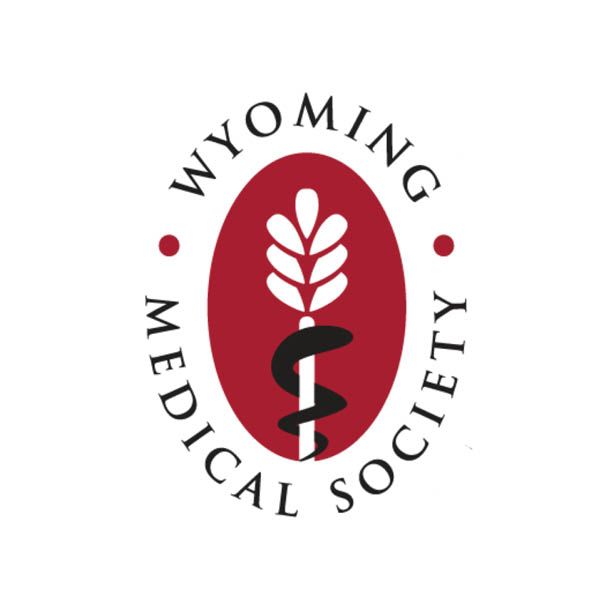





Browse Our Website
Contact Information
FAX: (307) 632-1973

